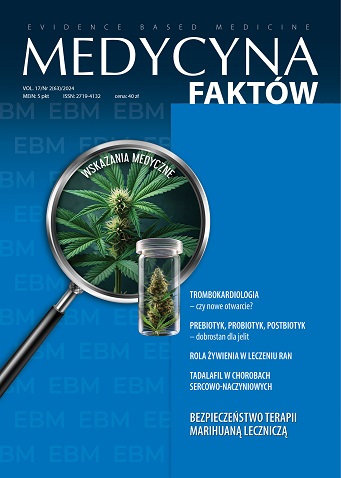Acetylsalicylic acid in cardiovascular prevention. Can dose matter? Review article
Main Article Content
Abstract
Acetylsalicylic acid is still the most frequently used antiplatelet drug, playing an important role in the treatment of cardiovascular diseases: acute coronary syndrome, chronic coronary syndrome, stroke, peripheral artery diseases. It is usually used at a dose of 75–100 mg, and the dose selection should take into account the patient’s profile: body weight, the presence of diabetes and the risk of ischemic and hemorrhagic events. Optimal dosage is particularly important in the context of aspirin resistance. Also very important is the possibility of improving the long-term cooperation of patients requiring the use of acetylsalicylic acid and how to prevent the relatively common problem of drug intolerance from the gastrointestinal tract.
Article Details
Copyright © by Medical Education. All rights reserved.
References
2. Visseren FLJ, Mach F, Smulders YM et al.; ESC National Cardiac Societies; ESC Scientific Document Group. 2021 ESC Guidelines on cardiovascular disease prevention in clinical practice. Eur Heart J. 2021; 42(34): 3227-337.
3. Baigent C, Blackwell L, Collins R et al. Antithrombotic Trialists’ (ATT) Collaboration. Aspirin in the primary and secondary prevention of vascular disease: collaborative meta-analysis of individual participant data from randomised trials. Lancet. 2009; 373(9678): 1849-60.
4. Antithrombotic Trialists’ Collaboration. Collaborative meta-analysis of randomised trials of antiplatelet therapy for prevention of death, myocardial infarction, and stroke in high risk patients. BMJ 2002; 324(7329): 71-86.
5. Bowman L, Mafham M, Wallendszus K et al.; ASCEND Study Collaborative Group. Effects of aspirin for primary prevention in persons with diabetes mellitus. N Engl J Med. 2018; 379(16): 1529-39.
6. Seidu S, Kunutsor SK, Sesso HD et al. Aspirin has potential benefits for primary prevention of cardiovascular outcomes in diabetes: updated literature-based and individual participant data meta-analyses of randomized controlled trials. Cardiovasc Diabetol. 2019; 18(1): 70.
7. Knuuti J, Wijns W, Saraste A et al. 2019 ESC Guidelines for the diagnosis and management of chronic coronary syndromes. Eur Heart J. 2019; 41(3): 407-77.
8. WHO Model List of Essential Medicines – 23rd list, 2023.
9. Lotrionte M, Biasucci LM, Peruzzi M et al. Which aspirin dose and preparation is best for the long-term prevention of cardiovascular disease and cancer? Evidence from a systematic review and network meta-analysis. Prog Cardiovasc Dis. 2016; 58(5): 495-504.
10. Rothwell PM, Cook NR, Gaziano JM et al. Effects of aspirin on risks of vascular events and cancer according to bodyweight and dose: analysis of individual patient data from randomised trials. Lancet. 2018; 392(10145): 387-99.
11. Eikelboom JW, Connolly SJ, Bosch J et al.; COMPASS Investigators. Rivaroxaban with or without Aspirin in Stable Cardiovascular Disease. N Engl J Med. 2017; 377(14): 1319-30.
12. Charakterystyka produktu leczniczego Xarelto 2,5 mg; tabletki powlekane.
13. Helgason CM, Bolin KM, Hoff JA et al. Development of aspirin resistance in persons with previous ischemic stroke. Stroke. 1994; 25(12): 2331-6.
14. Gum PA, Kottke-Marchant K, Welsh PA et al. A prospective, blinded determination of the natural history of aspirin resistance among stable patients with cardiovascular disease. J Am Coll Cardiol. 2003; 41(6): 961-5.
15. Dominiak M, Wcisło T, Krzemińska-Pakuła M et al. Predictors of successful acetylsalicylic acid resistance suppression after percutaneous coronary revascularisation. Kardiol Pol. 2013; 71(12): 1229-36.
16. Neubauer H, Kaiser AFC, Endres HG et al. Tailored antiplatelet therapy can overcome clopidogrel and aspirin resistance - the Bochum CLopidogrel and Aspirin Plan (BOCLA-Plan) to improve antiplatelet therapy. BMC Med. 2011; 9: 3.

